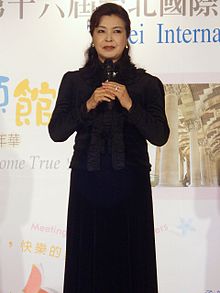music.wikisort.org - Singer
Riyoko Ikeda (池田 理代子, Ikeda Riyoko, born December 18, 1947) is a Japanese manga artist and singer. She is included in the Year 24 Group, by some, although her status as one of them has been debated due to a focus more on epic stories than the internal psychology of those mangaka.[1] She was one of the most popular Japanese comic artists in the 1970s, being best known for The Rose of Versailles.
| Riyoko Ikeda | |
|---|---|
 Riyoko Ikeda at 2008 Taipei International Book Exhibition | |
| Born | December 18, 1947 Osaka, Japan |
| Nationality | Japanese |
| Area(s) | Writer, Penciller, Inker |
Notable works | The Rose of Versailles Dear Brother |
Education
Ikeda was a philosophy major and a member of the Democratic Youth League of Japan.[2] She would later drop out.[3]
Career
Ikeda began publishing manga in the magazine Kashihonya while studying philosophy.[4] She debuted in 1967 with Bara Yashiki no Shōjo.[4]
Ikeda has written and illustrated many shōjo manga, many of which are based on historical events, such as the French Revolution or the Russian Revolution. Her use of foreign settings and androgynous themes made The Rose of Versailles and Orpheus no Mado enormous successes.[5]
Her most famous manga is The Rose of Versailles, also known as Lady Oscar in Europe. This manga, loosely based on the French Revolution, has been made into several Takarazuka musicals and into an anime series and a live-action film. After Rose of Versailles concluded, Ikeda wrote articles for Asahi Shimbun. In the 2000s Ikeda studied at a music school and became a singer. Her voice is in the soprano range.[6] She made a comeback to the comic industry as a script writer in 1999.[7] Her recent manga includes Der Ring des Nibelungen. It is a manga version of the opera written by Richard Wagner.
In 2008, she received France's Ordre national de la Légion d'honneur for her contribution to Japan's cultural awareness of France,[8] and she has been a guest of the 2011 Angoulême International Comics Festival.[6]
Works
- Bara Yashiki no Shōjo (1967) — short story
- Soyo Kaze no Mary — short story
- Francesca no Shouzou (1969)
- Sokoku ni Ai o (1969)
- Freesia no Asa (1970)
- Futari Pocchi (1971)
- Ikite te Yokatta! (1971)
- Jinchouge (1971)
- Mariko (1971)
- Sakura Kyou (1972)
- The Rose of Versailles (1972)
- Shiroi Egmont (1973)
- Yureru Soushun (1973)
- Shōko no Etude (1974)
- Dear Brother (1974)
- Orpheus no Mado (1975)
- Claudine (1978)
- Ayako (1980)
- Epitaram: A Wedding Song (1981)
- Aoi Zakuro (1982)
- Jotei Ecatherina (1982)
- Versailles no Bara Gaiden (1984) — extra chapters for The Rose of Versailles
- Eikou no Napoleon – Eroica (1986)
- Glass no Yami (1987)
- Mijo Monogatari (1988)
- Kasuganotsubon - Kefuzo Kataku o (1989)
- Porando Hishi Ten no Hate Made (1990) — Poland's Secret Story: To the Borders of Heaven
- Shoutoku Taishi (1991)
- Fuyu no Shukusai (1997)
- Elizabeth (1999) — text only; art by Erika Miyamoto
- Niberunku no Yubiwa (2000) — Der Ring des Nibelungen
- Ikeda Riyoko the Best: Ai to Tatakau Onnatachi (2001)
- Falcon no Meikishu (2004)
- Ai wa Waltz ni Nosete (2005)
- BeruBara Kids (2006) — The Rose of Versailles Kids (parody)
- Haru no Yuki (2006) — Spring Snow
- The Legend (Taiōshijinki) (2007)
- Taketori Monogatari (2014)
References
- Thorn, Matt (2005). "A History of Manga". Animerica: Anime & Manga Monthly. 4 (2, 4, & 6). Archived from the original on April 15, 2013. Retrieved January 2, 2008.
- Anan, Nobuko (February 2014). "The Rose of Versailles: Women and Revolution in Girls' Manga and the Socialist Movement in Japan" (PDF). The Journal of Popular Culture. 47 (1): 41–63. doi:10.1111/jpcu.12107.
- "Japanese readers lap up comic books". Reuters. Red Deer Advocate. October 23, 1983.
- "Riyoko Ikeda". Lambiek Comiclopedia. Retrieved March 24, 2021.
- Halldór Stefánsson (1994). "Foreign myths and sagas in Japan: the academics and the cartoonists" in Beyond Boundaries: Understanding, Translation and Anthropological Discourse, p. 88, edited by Gísli Pálsson. Berg Publishers. ISBN 1-85973-021-3
- Fallaix, Olivier (November 17, 2010). "Riyoko Ikeda au festival d'Angoulême" (in French). Animeland. Archived from the original on November 20, 2010. Retrieved October 16, 2016.
- "Historia de Amour — Riyoko Ikeda fanlisting".
- "Rose of Versailles' Ikeda Receives France's Top Honor". Anime News Network. March 12, 2009. Retrieved July 11, 2009.
External links
Другой контент может иметь иную лицензию. Перед использованием материалов сайта WikiSort.org внимательно изучите правила лицензирования конкретных элементов наполнения сайта.
WikiSort.org - проект по пересортировке и дополнению контента Википедии